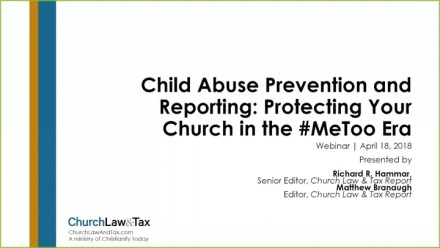Sunset Covenant Church had a pair of headaches last summer.
A burglar broke in and robbed the church, but the church had no inventory of its assets. So no one knew exactly what was missing.
Jelani Greenidge—co-pastor of the Portland, Oregon, congregation—had to sit down and make a list for their insurance company. Thankfully, it was short, he says. “I just know what’s in our storage closet and who uses what,” he says.
A laptop, a bass guitar, and some petty cash were missing, and the door had been busted in.
Many churches—especially smaller congregations—are in the same boat, says Brian Gleason, senior risk manager for GuideOne Insurance. They don’t have any kind of inventory of their assets, and if there’s a break-in or other loss at church, they’d be scrambling.
“If the church burned to the ground, all we have is a smoking pile of ash,” he says. “There is no way to identify exactly what all was in there. So the insurance company is going to ask for some kind of documentation.”
Still, churches are in luck these days, says Gleason. Modern technology—especially cellphones and video cameras—makes it easy for even the smallest congregations to keep track of their inventory.
Start with the big picture
Even a small congregation has a lot of stuff. And much of it is valuable, says Tom Lichtenberger, assistant vice president at the church insurance company Brotherhood Mutual.
He encourages churches to keep some kind of inventory—in part because they don’t always know how much they own.
“In today’s world, things are so expensive that you can go out and buy three things—and increase your inventory by $10,000,” he says.
Churches often have audio-visual equipment, computers, artwork, books, robes, and musical instruments: all of which add up.
In the past, churches have relied on spreadsheets and other lists to keep track of their inventory. Using a video camera or cellphone camera can speed up the process.
Rather than try to make a comprehensive list, start with a few photos, Gleason suggests. Take a walk through the church and snap photos with a cellphone of the church’s most valuable possessions, and try and show the condition of the items.
Capturing details like a make or model number is crucial. That can help adjusters place a value on items that might be stolen or destroyed. For instance, “there’s probably a plate on the organ with manufacturer’s name and other details,” Gleason says.
Taking photos can give a church—and an insurance adjuster—a good idea of what was in the room. An insurance company can work with that in case of a loss.This method can help a church keep track of its assets without having to document every item. It’s a method that Gleason learned in a previous job at a Christian university that had traveling musical teams. When the teams were back from the road, staff from the school would go into the storage closet and photograph all the equipment, which was much easier than making a list of each item. College staffers did the same in their maintenance workshop and other storage areas.
“Most insurance companies are reasonable,” says Gleason. “If the picture shows 12 music stands—and you make a claim for 14—we can work with that. What we don’t want is you claiming that there were 30 stands and the photo only shows 3.”
Take a walk around the building
Lichtenberger says most churches don’t really know how much property they own.
“If you don’t know what you had, it’s hard for us to replace it,” he says.
One quick way for churches to get a handle on their inventory is to do a video walk-through. Have a staff member or volunteer walk through the church with a video camera (or with the video function of their cellphone turned on).
Point the camera at everything in the room, zooming in on the make and model number of each piece of equipment, says Lichtenberger. If possible, get the serial number, as well. If a piece of equipment is stolen, having the serial number can help the police identify the item if it’s recovered.
Don’t worry about artistic quality. All you need is a clear photo or video that shows both the overall condition of items and a few details. The person shooting video can narrate as they go along, describing what they see.
This kind of walk-through can be completed in an hour or two, says Lichtenberger—and it’s a task that can easily be done by a team. He recommends splitting the task up between church staff and lay leaders.
Let the youth pastor document the youth room, since he or she knows best what is in there and what they use. Have Sunday school teachers document their rooms since they use those rooms week in and week out. Ask volunteers who run the soundboard to document the equipment they use. Have church musicians take a photo or video of the instruments they use (if those instruments belong to the church).
Make a copy
Once the video or photo walk-through is complete, download all the files and sort them, putting all the photos from each room into a folder for that room.
“With cloud storage and thumb drives, it’s easy to compile those photos and then keep a copy at the church and another copy offsite,” says Gleason.
Having photos, video, or other documentation can be a big help in case of a loss.
“If that information is readily available and easily retrievable, it can help accelerate the claims process,” says Jeff Szalacinski, vice president of claims for insurance company Church Mutual. “That can help get the church back on their feet as quickly as possible.”
And don’t overlook apps, he says. There are a number of smartphone apps that can be used to keep track of inventory; some of them use photos to keep track of items. Photos or digital copies of receipts can also be uploaded to the apps.
Among items that can be documented using video or photos:
- Communion ware
- Crystal or glass items
- Choir or clergy robes
- Musical instruments
- Audio-visual equipment
- Computers
- Artwork
- Statues
- Bells
- Chalices
- Pew Bibles and hymnals
Be thorough
Don’t forget to document every room in the church. Go to the fellowship hall when it is set up for a wedding or a banquet and snap some photos or shoot a few minutes of video. That can give a church an overview of how many tables and chairs they have—and the type and quality of those chairs.
Then peek in the kitchen and get a photo or video record of all the equipment there.
“Does your church have a 30-year-old Westinghouse oven—or a brand new Viking commercial range?” Gleason says. “We have churches in both categories—but the kitchen is an area where churches don’t have any kind of inventory.”
Some churches have even used drones to help them keep track of their property.
According to Gleason, GuideOne works with several contractors who use drones to get a closer look at a church’s roof—especially if it’s a steep roof. Drones can also be used to get a look at a church bell tower or other high elements, where it might be dangerous to send someone up to take a look.
“You don’t want to send anybody up on the roof if you don’t have to,” Gleason says.
Another area that churches overlook: the books in a pastor’s study.
“You’d be surprised how much some of these books cost,” Gleason says. “A pastor may [own] $10,000 to $15,000 worth of books.”
To document them, turn on a cellphone video camera and slowly work your way down the shelves. That way the pastor will have an inventory of what books he or she owns—without having to list each item.
When possible, also keep paper copies—and digital copies—of essential documents, like receipts, invoices, and owner’s manuals for equipment. An owner’s manual, for example, can have details like a make and model number. Put them all in one place, where they can be accessed if needed.
At Green Hills Church in Nashville, church staff rely on spreadsheets to keep track of all their equipment, furniture, and other assets. They also keep paper copies of documents.
Still, they’re hoping to add a video walk-through this summer, says administrative pastor Ricky Baxley.
The church has had to make several claims with their insurance company in the past. A construction worker caused a short in their electrical system several years ago, which caused about $100,000 in damage. They also experienced a break-in, in which some of their equipment was stolen.
In each case, having the right documentation and an inventory was a big help, Baxley says.
Don’t rely on memory
Lichtenberger says it’s hard—even for professionals—to give proper value to items in a room without some kind of documentation. He has an exercise he likes to do when training agents for Church Mutual. He will have them think about a room in their home—and then describe all the items in that room.
“Then I say, ‘Give me a make and model number,’” he says. That’s when the agents struggle. It’s hard enough to do that with one room in your home.
Now imagine trying to do that with a church. “It’s much easier to do if you have something documented before the loss—rather than trying to jog [your] memories,” he says. “You don’t know—don’t need to know—how many rolls of toilet paper you have. But having documentation of larger-ticket items would be helpful.”
Bob Smietana is a freelancer religion reporter based in Nashville.


















